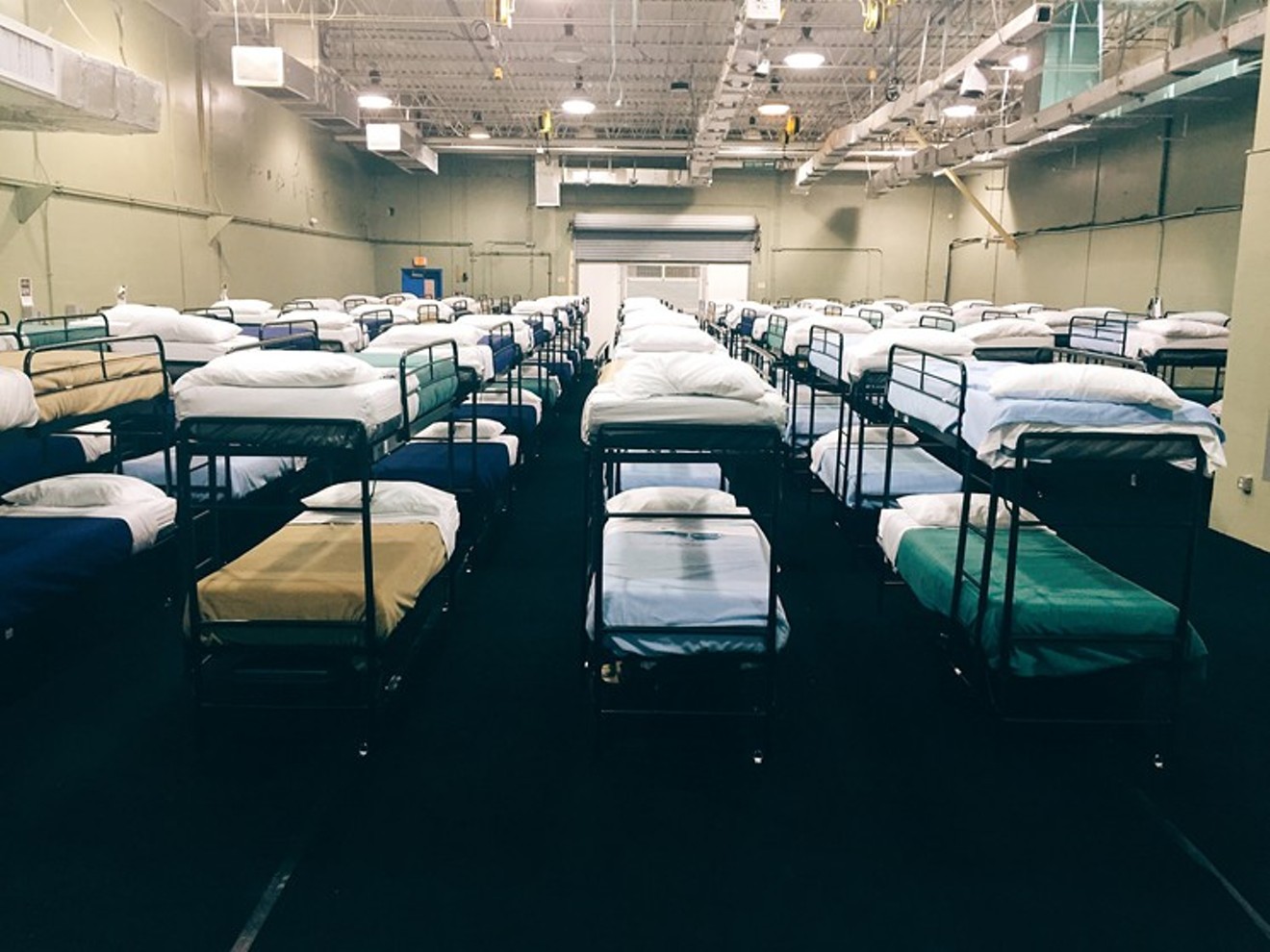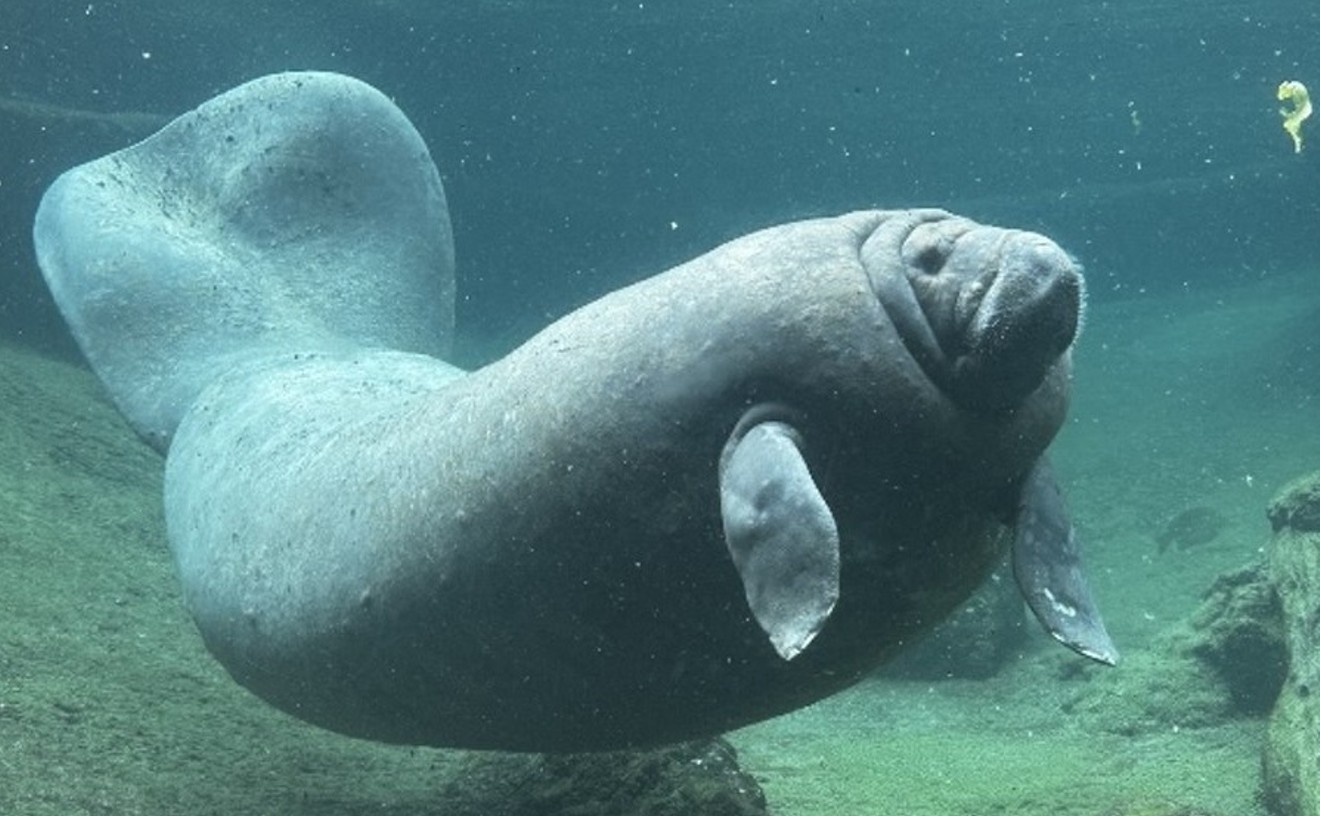Instead of releasing him to his relatives in Nebraska, though, the feds sent him to the Homestead Temporary Shelter for Unaccompanied Children. Orellana spent three months in the remote South Miami-Dade facility until April 8 — his birthday.
That's when Immigration and Customs Enforcement agents showed up at the children's shelter, slapped handcuffs on Orellana's wrists, chained them to his waist, and shackled his legs together. The agents drove Orellana to the Broward Transitional Center, an infamous immigration jail in Pompano Beach, where he was thrown into a cell with men twice his age.
Orellana's saga isn't just shocking — it's also illegal, say Miami immigration attorneys who have succeeded in forcing ICE to release several other 18-year-olds in recent months. Even worse, they say what happened to the Honduran refugee seems to have become ICE's national policy.
"When they turn 18, it's basically, 'Happy birthday,' and then they slap on handcuffs and take them off to adult detention centers," says Lisa Lehner, an attorney with the nonprofit Americans for Immigrant Justice who is representing Orellana.
Since April, at least 14 children at the Homestead center have been handcuffed on their 18th birthdays and taken to a jail cell in Broward, Lehner says. And at least one of those kids had been separated from his father under the Trump administration's since-abandoned policy to rip apart families that crossed the border together.
Lehner and her colleagues have filed seven lawsuits since early July on behalf of those 18-year-old immigrants. In five of those cases, ICE has quickly released the immigrants to relatives or guardians while their cases work through the courts. (Two cases are still pending, and Lehner expects to file several more in the coming weeks.)
"We've been successful in filing these petitions and getting ICE to act, but it would be much better if ICE would just stop this process in the first place," Lehner says. "The law is crystal clear."
Asked about the cases, Nestor Yglesias, a Miami-based ICE spokesperson, says the agency "conducts targeted enforcement in compliance with federal law and agency policy."
But Lehner says there are actually three legal precedents that should prevent ICE from throwing immigrants like Orellana who crossed the border as juveniles into lockup when they turn 18 without seriously working to release them to family members instead.
The first dates to 1997, when a group of immigrant children in detention centers sued the federal government; in settling the case of a young El Salvadoran named Jenny Flores, the government agreed to begin releasing juveniles as quickly as possible, preferably to family — but always into the "least restrictive" setting available.
Those protections grew even stronger in 2008 under the Trafficking Victims Protection Reauthorization Act, which set into law the rule that unaccompanied minors should be sent to the "least restrictive" option as soon as possible.
In 2013, Congress amended the law so it also applies to immigrant children who turn 18 and are transferred into ICE's custody.
The Obama administration mostly followed those rules, advocates say. In 2014, only 1 percent of young people in shelters run by the Office of Refugee Resettlement (ORR) "aged out" by turning 18, meaning ICE had to take them into custody, according to data compiled by Documented, an immigration news site; in the 2017 fiscal year, the number of kids handed to ICE on their 18th birthdays more than doubled.
Why? Because ORR is making less effort to hand kids off to relatives, activists told Documented, and also because many of their family members are also undocumented and hesitant to come forward under Trump's aggressive ICE policies.
Now it's clear that once those kids are handed over to ICE, they're immediately being thrown into adult jails without a day in court or any attempt to find the least restrictive option required by law, Lehner says. The crisis intensified in April, when ICE began separating families in immigration proceedings, leading to thousands of children — including infants — being taken from their parents and placed in shelters. Since then, more than 1,000 kids have been sent to the Homestead facility. Some of them have been separated from their families, and some crossed the border alone.
Although Trump said he would abandon his separation policy, his administration requested leeway to keep kids in detention indefinitely. A federal judge denied that request in July, citing the Flores settlement. The White House has said it plans to appeal.
These days, ICE is outright ignoring the rules set out by the Flores agreement and later put into law by Congress, Lehner says. Instead of trying to release the 18-year-old migrants to relatives or guardians, ICE is simply putting them in jail cells at facilities such as the Broward Transitional Center without due process.
"They're supposed to find the least restrictive setting, and instead of that, they're putting them in the most restrictive place," she says. "It's clear that this is a nationwide problem."
In some federal shelters, ICE agents show up at 11:30 p.m. the night before a young immigrant's birthday, says Janet Gwilym, the Seattle-based managing attorney of Kids in Need of Defense. When the clock strikes midnight, the agents handcuff and take the now-18-year-old kid away.
"I believe it's a psychological strategy they're using to try to get them to just give up and go back home, even if they know they'll be killed if they go back," Gwilym says.
In April, the National Immigrant Justice Center, a Chicago-based advocacy group, filed a class-action lawsuit on behalf of two minors detained by ICE when they turned 18. A judge quickly ordered the two immigrants released, but the larger class-action case — which aims to stop ICE's policy altogether — is still pending in federal court.
In the meantime, ICE's illegal policy has had devastating real-world impact on children at the Homestead shelter, Lehner says. Their stories, which are outlined in the federal cases brought by Lehner and her colleagues, share a common theme: Kids flee violence in Guatemala or Honduras but find only more pain in the United States thanks to ICE. (Honduran refugees lost temporary protected status in May thanks to a Trump order.)
Some examples:
- Maribel Calmo Mendoza's father was a high-ranking member of a political party that had recently lost elections before she left Guatemala. After his defeat, the ruling party brutally targeted her family. In January, men wearing masks and armed with machetes stormed her family's house, raped her mother, and tried to rape her. She managed to fight off an attacker, who severely slashed her hand with a machete. After another attack in May, the 17-year-old fled to America and turned herself in at the border, where she asked for asylum. She was sent to Homestead and, when she turned 18 on July 16, was handcuffed by ICE and taken to the Broward jail.
- Wilfredo Rivas-Barrera fled his native Guatemala when he was 17 because "gangs were regularly forcing teenage boys to either join them or face death." He made an "arduous" journey north, where he often feared for his life and suffered a gruesome injury to his arm when it caught on a nail in a car door. He hoped to stay with a cousin in Philadelphia while his asylum request was considered, but instead was sent to Homestead and then taken away in shackles by ICE agents on his 18th birthday on July 10.
- Junior Flores-Macias left violence-wracked Honduras on May 10, eventually crossing the U.S. border on June 16. He was quickly shipped to the Homestead shelter and then handcuffed on his birthday on July 17.
- Francisco Pacheco Azurdia started working as a welder when he was eight years old in Guatemala. Amidst the country's violent gang clashes, he fled to the U.S. on March 30 and was sent to Homestead. On April 9, when he turned 18, ICE sent him to Broward, where he was "surrounded by men in their 20s," according to his legal complaint. "He lies restless in his room while guards come in and slam the doors every 20 minutes," the complaint says. Asked how he was coping, he told his attorneys bien duro — really bad.
- Edgar Ahilon-Pablo fled Guatemala when he was 17 years old after being "threatened by gangs and criminals due to his poverty status and unwillingness to join the gangs," according to his complaint. He was sent to Homestead earlier this year. On July 6, his 18th birthday, he was cuffed by ICE and taken to Broward. He has a cousin in Oakland, California with whom he he hoped to stay while his court case proceeded. He told his attorneys that he is "marked for death" if he returns to his homeland.
- Tomas Teletor Garcia, unique among these cases, didn't travel to the U.S. border alone. He was 17 when he fled Guatemala with his father. When they reached the border, they were separated under Trump's immigration policy. With "no explanation," he was sent to Homestead and then spirited away by ICE on July 4, his birthday. When he pleaded for word on his dad, officials said he had already been deported. "[Tomas] was never contacted by any official of the U.S. government regarding his father's deportation," his complaint reads, "and no efforts were made to reunite him with his father."
He fled Honduras this past January 1 and eventually made it to the U.S. border. After asking for asylum, he spent four days in hielaras — or "iceboxes," immigration detention centers that critics say are rife with inhumane conditions — before being sent to Homestead.
Since being detained in Broward, he's endured significant psychological abuse, Lehner says.
"They're going in and handcuffing people who were children the prior day and taking them to adult detention," she says. "The Broward Transitional Center is a jail. It's an adult facility."
Orellana has suffered from severe headaches since the traumatic experience, Lehner says. As in her other cases, she's demanding that ICE follow the law by releasing him to his relatives in Nebraska while his asylum case works its way through the court system.
In five of Lehner's cases, ICE released the 18-year-olds before a judge could rule on her petitions. But those quick court victories haven't changed the agency's policy.
"They've picked up five more kids from the shelter just since we've filed these five successful petitions," she says.
Lehner's ultimate goal is to force ICE to stop its policy of handcuffing children — many of whom survived traumatic violence just to reach America. "This will eventually become a nationwide class action," she says. "But in the meantime, these kids are suffering and sitting in adult jails."
Update 5 p.m. In a statement, ICE declined to comment on the legal cases but defended its practice of taking 18-year-olds to adult detention centers on their birthdays. Here's the statement:
ICE is unable to comment on pending legal matters. ICE makes arrest and custody determinations on an individual basis based on the totality of the circumstances and does so in compliance with federal law and agency policy.












